
The number of stateless children born to refugees is growing in Hong Kong, where claims from asylum seekers have more than tripled in the last two years, alarming residents and lawmakers.
While Europe grapples with an influx of people desperate to escape fighting in Syria, asylum seekers from Asian nations such as Bangladesh, India, Pakistan and Vietnam are flocking to Hong Kong, along with a sprinkling from Africa.
But human rights activists and non-government bodies accuse authorities in the Chinese-ruled city of dragging their feet on the approval of claims, to avoid spurring a further influx.
Hong Kong has approved just 52 of more than 8,000 claims since 2009. There are more than 11,000 asylum seekers in the Asian financial hub, some still uncertain about their fate after waiting for more than 15 years.
"Our future is already gone, so we are thinking of our kids' future," said Adjouma Ibrahim, chairman of the Refugee Union, who has been in Hong Kong for 11 years.
"Our kids are stateless. We don't have travel documents – nothing," he told Reuters.
Ibrahim is from Togo in west Africa, and his son and daughter, despite both having been born in Hong Kong, are among the more than 580 refugee children denied the right of abode, making it impossible for young people to get jobs or leave. The government of the former British colony pays 30 percent of the costs for refugee children to attend school, but few parents are able to pay the rest, as they cannot legally work while waiting for their status to be approved.
"One of the very negative parts of the system here in Hong Kong is children of asylum seekers and refugees," said Mark Daly, a principal at law firm Daly and Associates, which focuses on human rights.
Despite being born in Hong Kong and fluent in both English and the Cantonese regional dialect, they are not allowed to work, Daly said.
"They are trying to think about their futures and thinking about decisions they shouldn't have to make - 'Where do I go, what do I do, what can I work as?'" he added.
The refugees have become a sensitive topic for residents and politicians, with media often blaming them for a spurt in crime.
Such portrayals feed prejudice, said Rizwan Ullah, an educational adviser of the Pakistani Students' Association in Hong Kong.
"These stereotypes bring prejudice, and that brings discrimination," he said. "These guys are not criminals. They just want a better situation."
Politicians have pushed for tighter curbs after the government adopted a screening mechanism in 2014 to select those meeting the refugee criteria set out in international law.
"Hong Kong is a very convenient place and our government has been very generous to people who seek asylum," said Dominic Lee, a Liberal Party official.
"This provides a huge incentive for these fake refugees to come to Hong Kong and take advantage," added Lee, who is demanding repatriation of refugees and camps to house them.
The government did not immediately respond to a request for comment. However, in a legislative document this year, it acknowledged the need to streamline the lengthy screening process. Over the past five years, it has more than doubled the number of staff handling claims.
For Mohammad Kazi, a former member of the Bangladesh National Party, Hong Kong was the best place to escape the danger he said his family had faced at home.
He hopes to settle in Hong Kong permanently, despite house prices that rank among the world's highest, but is unable to send his daughters, Shahzia, 5, and Samia, 6, to school.
"I want my children to have a good future. If we go to Bangladesh, we die," added Kazi, 40, without giving details of the threat. "Here we are together, we are family."
Source: Reuters
 FR
FR EN
EN AR
AR








